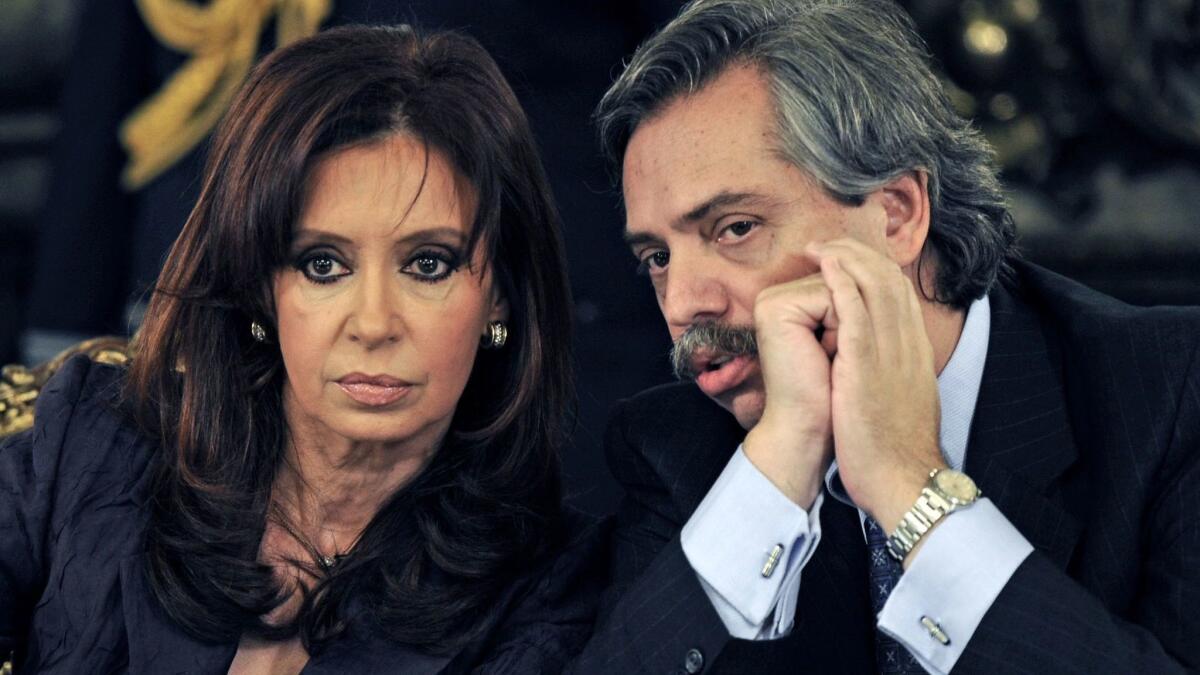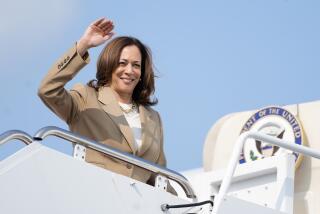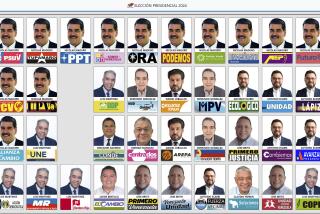Cristina Fernandez, former president of Argentina, announces vice presidential bid

Reporting from BUENOS AIRES — Argentine former President Cristina Fernandez de Kirchner on Saturday announced her candidacy for vice president in October’s general elections, a surprising move that now puts a more moderate challenger at the helm of the presidential ticket.
In a video posted on Twitter on Saturday, Fernandez said that Alberto Fernandez of the left-leaning Citizen’s Unity political party will run for the presidency against conservative President Mauricio Macri.
“I have asked Alberto Fernandez to head the formula that we will integrate together, he as a presidential candidate and I as a vice presidential candidate,” Fernandez said. “I am convinced that this formula that we are proposing is the one that best expresses what Argentina needs at this moment to summon the broadest social and political and economic sectors.”
Alberto Fernandez served as chief of staff from 2003 to 2007 for Fernandez’s predecessor and late husband, Nestor Kirchner. He remained in the position during a portion of Fernandez’s term as president from 2007 to 2015, but left after a steep economic crisis took hold.
In announcing her vice presidential bid, Fernandez said that she was “convinced that personal expectation or ambition must be subordinated to the general interest,” and called the country’s current economic situation “dramatic.”
“Never [have there been] so many sleeping in the street. Never so many with problems about food, about work,” she said.
Some polls have suggested Fernandez could defeat Macri in a second round of voting, but it is unclear how those prospects will change now that she has thrown her hat in the ring in a lesser capacity. Although many had assumed she would run for the top post, her decision to pursue the position of second-in-command reflects possible doubts over whether she is best positioned to challenge Macri directly in light of a series of looming corruption trials.
Argentina’s Supreme Court has said the first corruption trial against Fernandez could start as early as next week, despite a judicial order that her opponents feared could delay the trial into the presidential campaign season or beyond.
Fernandez has been accused of taking bribes in exchange for public work contracts, but denies wrongdoing and says lower courts did not allow her to present more witnesses. In separate cases, she faces several formal investigations into allegations of bribery, money laundering and criminal association during her administration and that of Kirchner.
Still, many voters are frustrated by an inflation rate that reached 47.6% last year, the highest since 1991, and a decision by Macri’s government to slash subsidies on utilities and public transportation. In April, the Argentine peso hit a record low as a result of growing distrust of the conservative president’s economic management.
Macri says he underestimated the macroeconomic imbalances inherited from his populist predecessor, the center-left Fernandez. He has also argued that correcting them became more difficult when Argentina’s worst drought in decades deprived his government of much-needed farm export revenue.
At a political meeting on the outskirts of Buenos Aires, he appeared to respond to the announcement by saying that “going back to the past would be self-destruction.”
Fernandez, 66, was known for her interventionist and populist policies while in office. Some credit her for leading the country out of an economic crisis, while others blame her for creating its current woes. But in announcing the presidential candidacy of her running mate, she appeared to be the one who could effectively pull the ticket’s strings going forward.
Mariel Fornoni, director of the political consultancy Management and Fit, said that voters who were somewhat apprehensive of Fernandez could be more willing to vote for the Citizen’s Unity party with Alberto Fernandez as the leader and Fernandez as the vice presidential candidate.
“It seems to me that all this is aimed at a more moderate voter,” Fornoni said, noting that Alberto Fernandez is praised by some for his work during Kirchner’s administration. “Painting him as Nestor’s chief of staff when we left the crisis is associated with having someone with experience.”
Since leaving office, Alberto Fernandez has been critical of his current running mate — going so far as to even oversee the campaigns of her political opponents.
Fernandez said in her video message Saturday that she had known Alberto Fernandez for 20 years, but she also acknowledged that there had been “differences” between them.
Alberto Fernandez did not comment publicly on her announcement, but appeared to confirm his candidacy on Twitter by saying that he would help make “the country that all Argentines deserve,” and would “return dignity to millions.”
Roberto Bacman of the Center for Public Opinion Studies said that the former chief of staff “has another profile,” which is not “the profile of someone from Cristina’s central core who strictly repeats everything she says.”
The ticket, he said, “totally changes the direction of electoral politics, the electoral hypothesis and the measurements that had been made so far.”
More to Read
Sign up for Essential California
The most important California stories and recommendations in your inbox every morning.
You may occasionally receive promotional content from the Los Angeles Times.










